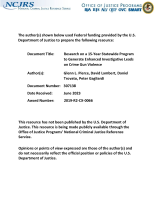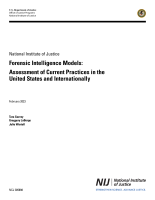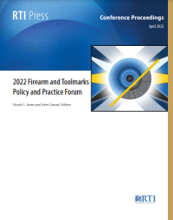Forensic intelligence
Introducing the NIJ Forensic Intelligence Framework: Pillars and Guiding Principles for Successful Implementation
Advancing Justice for the Missing and Unidentified Through Research - 2024 NIJ Research Conference
Forensic science research is developing essential knowledge to fill in the holes in death investigations, creating new ways to identify challenging skeletal remains. These methods inform cause of death, time of death, and familial relationships to guide investigations, identify suspects, support prosecutions, and bring justice to families.
See the YouTube Terms of Service and Google Privacy Policy
The Impact of Processing and Sampling Procedures on the Integrity of Forensically Relevant Biomolecules in Bones
Collaborative Exercise: Analysis of Age Estimation Using a QIAGEN Protocol and the PyroMark Q48 Platform
Reducing Gun Violence Through Integrated Forensic Evidence Collection, Analysis, and Sharing
Multi-pronged approach of data integration, collaboration, and intelligence-led policing has helped reduce gun violence in New Jersey.
NIJ Journal No. 282 — Violent Crime
Intelligence and the Value of Forensic Science
What FSSP Leaders Should Know About Artificial Intelligence And Its Application To Forensic Science In-Brief
Missing data reconstruction using Gaussian mixture models for fingerprint images
Understanding Forensic Intelligence: The NIJ Framework
Understanding Forensic Intelligence: The NIJ Framework
Quantitative and visual prediction of eye, hair and skin color from DNA
Cold Cases and Serial Killers, Part 1
In April 2018, the Golden State Killer, Joseph DeAngelo was arrested. NIJ support helped lead to his arrest, and in the aftermath of the arrest, NIJ Social Science Analyst Eric Martin was among those tasked with finding other cases NIJ helped law enforcement solve. Eric joins the show to talk about some of those cases, and answer some broader questions about serial killers: What is a serial killer? Are they on the rise? How do we know how many serial killers are currently active?
2023 NIJ Research Conference Opening Ceremony
The theme of NIJ’s 2023 Research Conference was “evidence to action,” and our goal was to bring researchers and practitioners together to learn about the latest research evidence and how it can be implemented to promote safety, equity, and justice.
The opening ceremony included remarks from U.S. Attorney General Merrick B. Garland, Assistant Attorney General for the Office of Justice Programs Amy Solomon, and NIJ Director Nancy La Vigne.
See the YouTube Terms of Service and Google Privacy Policy
Research on a 15-Year Statewide Program to Generate Enhanced Investigative Leads on Crime Gun Violence
Image Analytics and Artificial Intelligence Architectures for Medical and Forensic Applications
Forensic Intelligence Models: Assessment of Current Practices in the United States and Internationally
Stability of nonsteroidal anti-inflammatory drugs in contaminated fingermarks probed by Raman Spectroscopy: Effect of temperature and time since deposition
Digital Transformation of Cold Case Reviews: Prevalence, Challenges, and Benefits of Just Resolutions
Shedding Light on Assault
NIJ Awards Over $11 Million to Support Forensic Science Research and Development in 2022
On September 30, 2022, NIJ announced $11.6 million in funding to support 23 projects under the “NIJ FY22 Research and Development in Forensic Science for Criminal Justice Purposes” solicitation. Through its research and development grant funding, NIJ continues to advance the speed, accuracy, and reliability of forensic analysis, which ultimately bolsters the...
Footwear Databasing to Support Forensic Intelligence
What's Possible with Rapid DNA Technology?
NIJ scientist Tracey Johnson joins science writer Sarah Michaud in this episode. They discuss Rapid DNA technology, and Tracey explains the complexities of this technology – its pitfalls and its possibilities.
Reading and Resources from NIJ:







